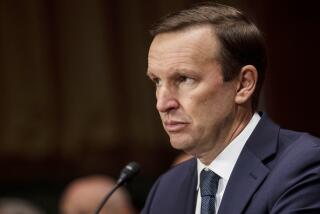Democrats, GOP Square Off Over Use of Tobacco Money
- Share via
WASHINGTON — The White House and congressional Democrats are waging a last-minute fight against Republicans and state lawmakers to ensure that states spend some of the billions of dollars they are scheduled to get from cigarette manufacturers on smoking prevention and other social programs.
Some Republicans are proposing that a provision be added to a federal spending bill that would give the states a blank check to spend the tobacco money as they see fit. The Republicans are backing up the nation’s governors, who have been fighting for nearly two years to stop the federal government from dictating how the states use the settlement money.
However, the federal government has a claim on at least some of the money because federal dollars finance a large part of Medicaid, the health care program for the poor and disabled. And the states sued the tobacco industry in part on grounds that the industry should reimburse taxpayers for the cost of treating Medicaid beneficiaries with tobacco-related diseases.
Anti-smoking groups and leading tobacco industry critics, such as former Surgeon General C. Everett Koop and former Food and Drug Administration Commissioner David A. Kessler, are worried that if Republicans have their way none of the money will be earmarked for smoking prevention and cessation.
“For a Congress that has said on a bipartisan basis that it is committed to finding a way to combat tobacco use among children . . . to not commit a single penny to programs designed to reduce tobacco use would be the height of hypocrisy,” said Matthew Myers, general counsel of the National Center for Tobacco-Free Kids. The center is a member of an anti-smoking coalition that includes the American Heart Assn. and the American Cancer Society.
The coalition would like to see no less than 30% of the proceeds from any settlement with the cigarette manufacturers earmarked for tobacco control and health care, according to an Oct. 6 letter that the group sent to Senate Minority Leader Tom Daschle (D-S.D.).
However, the nation’s governors have been lobbying to let the states spend the money as they see fit. In a recent letter, the governors asked Congress to protect the tobacco settlement funds “from seizure by the federal government.”
Sen. Kay Bailey Hutchison (R-Texas), who represents the state that has won the largest settlement from the tobacco industry, $15 billion, has proposed adding to the federal spending bill a provision to waive all federal claims to the money.
The governors have become more resistant to federal involvement since the summer. At that time, after intense negotiations, they agreed that they could live with a requirement that part of the money be spent on programs to help children, including health care and child care.
“Our position was always that we wanted the money unfettered,” said a source close to the governors. “We don’t feel that, just because we agreed to that list of social programs last summer, that commits us in any direction right now,” the source said.
Anti-tobacco legislators fear that some states will simply use the money to pay for ongoing state programs rather than put it into tobacco control or health care.
“The states shouldn’t be allowed to have all this money to spend on building roads and prisons,” said Rep. Henry A. Waxman (D-Los Angeles). “They should be required to use it for anti-tobacco efforts and other health needs.”
Waxman added that the requirement is necessary because in the past the states hardly have been reliable guardians of Medicaid money. Some states have arranged to leverage extra dollars out of the Medicaid programs for an array of projects that have nothing to do with health care.
Sources close to the state attorneys general and the cigarette manufacturers have been working for the last four months on a settlement that they estimate would cost the tobacco industry $200 billion over 25 years. The amount would be split among 46 states. Four states have already settled for a total of $41 billion.
White House officials said that, if the GOP-backed waiver of all federal claims to the settlement money goes into the federal spending bill, President Clinton will veto it.
More to Read
Sign up for Essential California
The most important California stories and recommendations in your inbox every morning.
You may occasionally receive promotional content from the Los Angeles Times.













